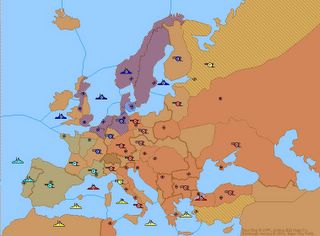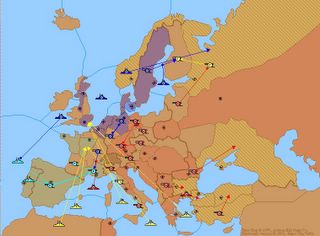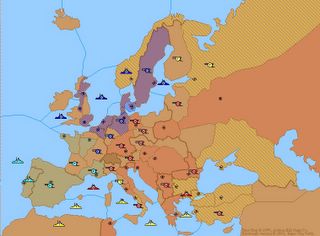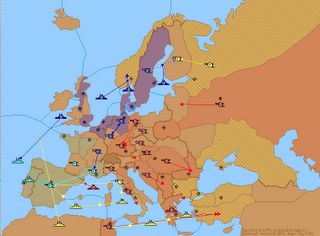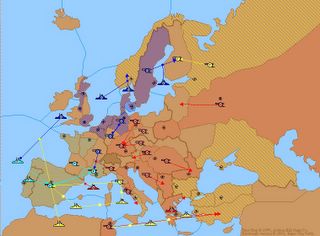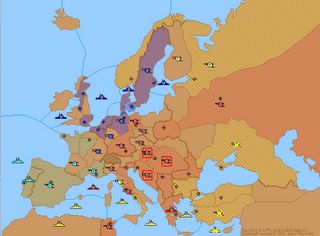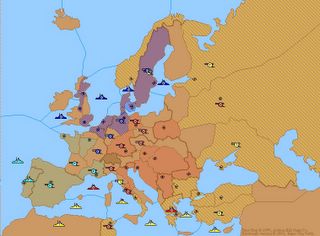After the war: The Egocratic After Action Report
At last!
After all this time having insider's knowledge on what was going on during the game, I finally can talk about what I think was going on at each stage, and what I learned of all this furious mailing.
I must say that I've read 90% of everything writen by the players during the whole game, more than 1500 messages. Some of them really, really long. Damn you, verbose players, sometimes. It has been really, really fun. At several occasions, I was almost as confused as anyone else, as I knew what each country was saying, but not which message was the real position that was going to be put in the orders. Some of the requests for thoughts from the players were had the AAR in mind, but most of them were to ensure I knew what I was going on. Of course, as everyone was equally confused, some of the reports were actually even less clarifying. Oh well.
I am going to touch several subjects here, so let's get started. First of all:
Lessons from the control room: what the judge has learned about Diplomacy
You always learn in a game of diplomacy; either from your own mistakes on the havoc you inflict in your opponents. Being behind the scences, I learned even more. Some of the most relevant lessons are:
Talk, talk, talk:
No matter who you are, how pissed you are with some opponents, or how far is someone from you in the map, talk. If you are alive long enough, you'll be grateful that you wrote to the remote (insert country name here) and you have shared plans with them. Russia and Italy didn't talk enough, for instance, when they both had strong hints of what fate awaited the other country. When they needed each other's knowledge, they lines of communication were already too limited.
The other case where the lack of communication caused huge problems to a country was France, before the English ill-fated stab. They had doubts about what to do, and decided to limit the amount of comunication sent. England understood that as lack of cooperation, and decided to go after them after Austria and Turkey lobbied heavily in that direction. Had France been more talkative, England would probably have waited, and avoided three precious turns mending bridges afterwards.
Timing the stab:
There's only one valid way to stab someone: leaving him completely crippled. Anything short of that equals a pissed off opponent and wasted time. Sometimes you can rebuild the trust (England and France) sometimes you can't; but the time loss is already there.
Case in point, again England. The stab was not brutal enough to be crippling, and the damaged France turned out to be necessary shortly afterwards. At least a couple of turns were lost in slow, careful moves to rebuild the trust. The time lost there could have been used to cross the stalemate line in time to avoid the horrid endgame.
About non-crippling stabs, the awful mess in the balkans early in the game is a clear example. If you break promises (Russia, Italy), it has to be for a good reason, and decent gains. Not doing that is bad for your Imperial health,
Being flexible doesn't mean lacking focus:
Italy is the posterchild in this case. They had a wickedly fun position in Summer 1902-Spring 1903, with an assload of possible moves and alliances. However, they alternated misstreating and lying to Austria with not attacking her, getting their ass kicked shortly thereafter. Turkey or Russia would have loved their help, but after pissing the Austrians off, they moved to Munich, only to get ruthelessly backstabbed.
Same for Russia. I always have found that it is the most difficult country to play, as it is really easy to get overextended. You can play in too many fronts, piss off too many people, and then get wiped out by being stabbed by two guys in the opposite sides of the board, Britain and Turkey.
Always have the worst in mind:
The Austria-Turkey alliance was strong, and from pretty early in the game. I really didn't notice how strong it really was until early 1903. France and England didn't have the same amount of information I had, but they really didn't consider them as a "single country" until the winter of 1905. Way too late.They had been cooperating for two full years clearly; they couldn't be certain, but they should have at least had it in mind. Specially if the idea of stabbing each other was in the table.
So they wasted the most precious resource in the game....
You can trade everything but time:
That's the biggest lesson for me in this game. Time is the most precious resource you have in the game, period. Slowing down to consolidate a line can be the difference between victory or stalemate.
Several examples. Dealing with Italy, for instance; Turkey and Austria slowed down there. The ill-fated English stab. Austria moved North one turn too late, only to be trapped at Germany, in part because Russian affairs slowed what should have been an earlier invasion. Turkey giving advice to France to counter the English stab, speeding up the build up of the stalemate line.
The game is highly positional, and has well-known stalemate lines. The only way to beat tactics is crossing those lines before the other side thinks they need them. Time is everything.
Extermination is not always needed:
Why the hell Turkey decided to anhilate the Russians? That fleet was crucial, after reaching the stalemate line too late. The game was there.
The end game: Turkey is a coward
I am going to be blunt, but Turkey deserves it. If you have a look at the early Spring 1907 positions, you can see why I am quite disappointed about how the game ended. The stalemate line is in place; there's no way that France or England are going to open the door. Turkey and Austria have arrived one turn late to the invasion positions, after England and France stabbing.
Look at Turkey's position. They are at 10; without any help, they can stab Austria and get to 13-14 by the end of the year. They don't have any stalemate line to breach against their ally, and they can secure on their own the Med Line and draw a line in St.Petesburg.
Basically, a Turkish stab in Spring 1907 was a hell of a good shot on a solo victory by Fall 1908- Spring 1909, with a bit of luck and tactical mojo; well within the reach of their leaders.
Because boys, remember: Diplomacy is not a fucking team game.
The stalemate line was set. You wanted a two way win, you can't get it, no matter what; the stalemate line is there, and France and England are no longer being stupid. If you have a shot to win solo because your ally trusts you too much, go for it.
And no, the stalemate line was not "unfair" or boring. It is the essence of the game. The lines are there for all players; if the other side manages to build one, it is your fault, not theirs nor the game's. It means that no more gains from there. Tough luck. Whining and commiting suicide is not a brave way out, specially when victory was at hand more than once.
You still want to get a two way with Austria? Fake a stab. It is a well honored practice; feint and attack, make your own line fall back, lure the other side out of the trenches, counter attack from a better position. It can be done, it works, and it is a hell of a cool way to work.
Commiting suicide goes against what the game is about, seven self-interested individuals seeking to maximize their power using their brains. It is irrational, and runs against the spirit of the game. Even moreso when one considers that the country that vaporized could have won with just a simple stab in early 1907.
Still...
The moron of the game award goes to Germany. Good Lord.
The countries than I think had a good shot at winning the game were Turkey (Austria was beging for a stab, totally exposed, since late 1904) and England (stabed France at the wrong time; both too early and too late). France had a long shot the moment Russia crumbled. Italy could have gone far but lacked focus. Russia overextended. Germany... ugh.
And that's it. AAR by the judge.
